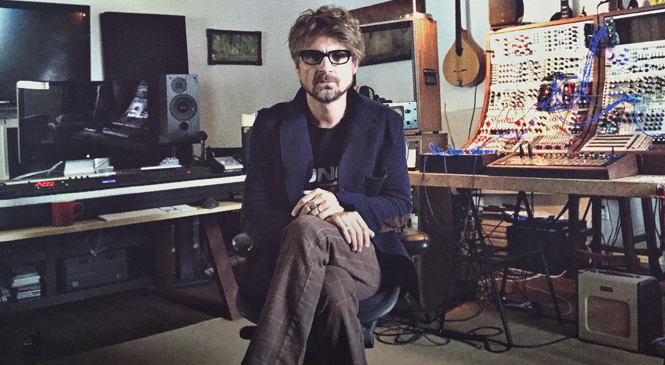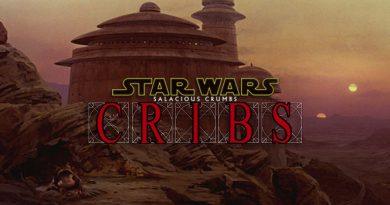Composer Justin Melland Goes Dark for Showtime

[interview by guest contributor Jordan von Netzer]
If you haven’t caught the Showtime documentary series Dark Net yet, you may not know it’s set to air its season finale this week. The show explores the vast cyberworld that connects us all, and not always in good ways. The advancements in technology make a lot of things possible. Doesn’t always mean we should be doing such things.
Justin Melland is the composer for the show, and he brings his long career of documentary music scoring to this project with a mix of influences and instruments.
How familiar with the story do you like to get before starting to compose? Did you know about this so called ‘deep web’ before working on this show?
One of the coolest aspects of scoring Dark Net, is how much I learn when I’m working on the show. I’m a bit of a tech geek, and I love reading stories about hackers both real and imagined, so I had heard of a few of the major topics. I knew that the deep web existed, and that people access it with the TOR browser. And thanks to Cory Doctorow, I know how the technology of the browser works. But, there have been quite a few mind blowing details in the show. For example, there is a story about a Spanish town called Jun, that calls itself “Twitter Town”, because they are completely linked up with Twitter. They use it to run the whole city. That episode was completely educational! I love it when a show turns me on to a whole new part of the world I didn’t previously know about. Sometimes that actually makes it more fun for me. It’s an unexpected beneficial development.
What got you into composing?
I have been a musician all my life, and have been writing music since I was a boy. I have actually never imagined another career path for myself. I’ve always had a very special appreciation for composers and songwriters. They are often the unseen puppeteers of music. The grand architects of sonic design. I followed my nose into music school and majored in music composition with and piano was my main instrument. I essentially had no idea what would happen after college, but I saw getting a degree in music as a fantastic opportunity to get really good. So, I just took it. Toward the end of my undergrad studies at the University Of Washington, Hummie Mann came to talk with our class about his film scoring school, which offered a yearlong intensive course. I really wanted to take this class, but being a poor student, I didn’t have a dime. So, Hummie took a liking to me and let me pay my way by copying out a gigantic handwritten big band score of his into Finale. That gesture was instrumental in creating the opportunity I needed to learn some seriously valuable skills about working in Hollywood, and I will always be grateful to him for doing that for me.
The job I did that paved the way for my whole career, was just a little thing that came up when I was doing my Masters in Music Composition at UC Berkeley. A couple of students from the J School there wanted to work with some composers from the music department, and everyone in my department snubbed them except me. I did three little shorts, and one of them, called When the Storm Came, won the Sundance Film Festival. Then the next year, Dan Krauss called me up because he was in the same program and needed a composer. So I scored his film called The Death of Kevin Carter, and we got nominated for an Oscar. After that, I started getting a lot more work, and it’s been steady ever since.
How did the opportunity to score this project come about?
One of my favorite collaborators, Part2 Pictures called and told me they were doing a very cool show for Showtime that was going to need a lot of edgy electronic music and my special blend of eclectic instruments. I got super excited and basically said, “Great! When do we start?” That’s when I learned that I would have to be pitched to Vocativ, the company that created the show and sold it to Showtime. This introduced the chance that I might NOT get the gig, and that was entirely brain torturing! But, this is the nature of getting a big job in this business. Even if you are a favorite, you must be thoroughly vetted by everyone involved. It can be the hardest part of the process! Eventually, it was time for me to be formally introduced to Vocativ. Once I had done the formal meeting, and submitted my music, it was time to wait. And wait I did. For what seemed like forever. Then one day, while I was vacationing with my friends and family, my agent called during a lovely outdoor dinner in Quinson, France and said we were chosen to score the series. It was one of the happiest days of my career
What process do you use to decide instrumentation for your scores?
My process has been to collect instruments. I am a guitarist and pianist, and so I focus on finding instruments in those two worlds. The more eclectic they are, the better. I collect new, vintage and modular synthesizers, guitars, and other things that are plucked, and I have one very unique instrument called a Guitarviol made by Jonathan Wilson here in LA. You can see me playing it in this video:
So, I collect and get very intimate with these instruments and assimilate their sound into my composer mind. I do this so that I have the feeling of these instruments floating around in my subconscious. Then I watch the film, paying extra attention to the characters in question. You see, every scene and every music cue in the film, is about a character in one way or another. That character has a perfect sound, and a perfect harmony. It is the composer’s job to find those sounds. So, after I’ve taken in the film, I get really quiet in my mind, and then all of a sudden, I’ll start getting ideas of instruments that I should use. That’s why I like to have so many different instruments that I can play. I need to be able to pick something up, or plug something in, and immediately start playing it, so I can see if my intuition is right. Once I’ve done what I think is perfect, then I send it off the director/producer to see if they agree.
How valuable is the use of silence in your scores? How do you determine when it’s best not to have music?
Silence is incredibly important in my scores. In general, I prefer a minimal approach to scoring and orchestration. I firmly believe in headroom. Room in my mixes, my orchestrations, and my film scores. The best way I decide whether or not we need music, is to feel how the scene is working on its own. If it has a strong rhythm and if the characters are really getting the emotion across, then we don’t need music to fix anything. This is a great start! Then I search the scene to discover if there is an important creative reason for having music in a scene. If there is no special reason for music, I will make the argument that we should not have it. If there is too much music, then I can’t do one of the most important parts of scoring, which is to enter at the right moment. The entrance is actually more important than the notes I play. If I get that wrong, then even the right music won’t help. But, if I come in at the right time, with the right music, then magic happens!
How collaborative do you like to be when dealing with producers/directors?
I love collaborating with producers and directors. This is why I love film scoring. I love to see my music fitting into the larger architecture of a film or TV series. It’s a wonderful art form, this modern storytelling that we do. The combination of all these different mediums and the geniuses behind their manipulation is really something incredible. I also have endless respect for a true visionary. When a director has a firm grasp on what we are doing in a film, that usually means he or she also has a strong vision for what music needs to do. This takes a leap of faith on my part, but if I can just trust in the director’s vision then I’m usually always glad to put in the extra mile to hit their mark.
How much music did you have to create for each episode?
I create about 20 to 26 minutes of music for each episode, and do it in a week to 10 days.
We know your scoring technique can be classified as a “modernizer of vintage sounds”. Can you give us some examples of this with the Dark Net score, which vintage sounds did you specifically manipulate?
One of my favorite vintage sounds that I love to work with is the Buchla 200 modular synthesizer. This is a synthesizer from the 1970’s that has an incredible, unmistakable tone. It’s very easy to make it sound sci-fi and retro. But, what I’ve found is most rewarding, is the use of it in a modern context. This modern framework is made up of my own blend of harmonies and rhythms, which are very much rooted in contemporary film composing. A very special sound starts to emerge when combining these processes. You can see what I mean in the track : AM I ASLEEP from Dark Net season 2. The modulated bass line is the Buchla 259 Complex Oscillator.
https://soundcloud.com/justin-melland-music/dark-net-s02-e03-am-i-asleep?in=justin-melland-music/sets/selections-from-season-dark-net-season-2
One more example is the way I make many of my percussion sounds. I have a couple of really old instruments, one of which is a True Tone guitar that is 90 years old. It’s a cheap, pine acoustic guitar made by Sears, but it has a fantastic tone. I had a pickup installed on it, so I can run it through my vintage amplifiers. But, the tricky thing I do with it, is make percussion sounds with it. Bass Drums by tapping the body. Snares, by smacking the strings with a paint brush, and shaker/hi hat sounds by lightly tapping various places all around the guitar. Then I bring the sounds into my sequencer, chop them up and make patterns out them. You can hear how this is done on the cue “Who’s Face Are You Wearing” which is also from Season 2. (there is also ample use of a Juno 6 playing the big chords in this cue, which is also a vintage instrument.
https://soundcloud.com/justin-melland-music/dark-net-s02-e05-whos-face-are?in=justin-melland-music/sets/selections-from-season-dark-net-season-2
What is interesting about this show is it was developed by a tech and media company, Vocativ. Because it was developed by a tech company were the perimeters for the score different than other projects you have had with traditional film/TV companies?
It hasn’t been different at all actually. Dark Net is a show about people, characters lost in various webs of technology. So, the focus has been the same as what it is on any good show, the story and making sure to support it with our finest work.
_______________
Dark Net airs Thursday night at 10pm E/P on Showtime.
![]()



